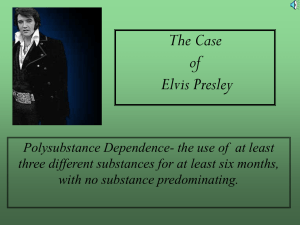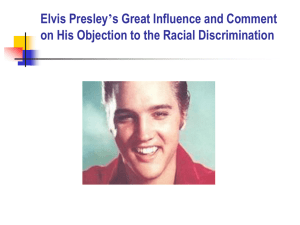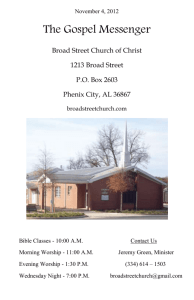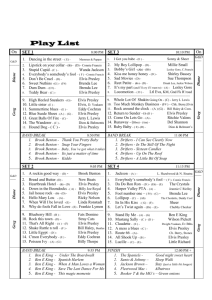Elvis Presley Family History: Ancestry & Genealogy
advertisement
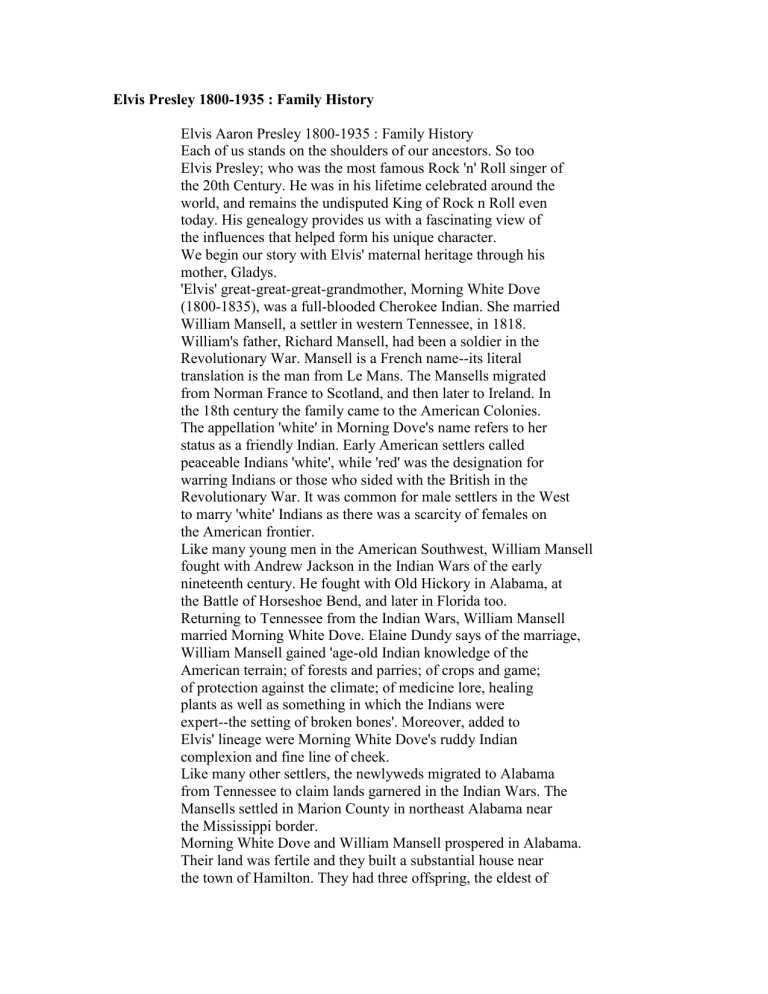
Elvis Presley 1800-1935 : Family History Elvis Aaron Presley 1800-1935 : Family History Each of us stands on the shoulders of our ancestors. So too Elvis Presley; who was the most famous Rock 'n' Roll singer of the 20th Century. He was in his lifetime celebrated around the world, and remains the undisputed King of Rock n Roll even today. His genealogy provides us with a fascinating view of the influences that helped form his unique character. We begin our story with Elvis' maternal heritage through his mother, Gladys. 'Elvis' great-great-great-grandmother, Morning White Dove (1800-1835), was a full-blooded Cherokee Indian. She married William Mansell, a settler in western Tennessee, in 1818. William's father, Richard Mansell, had been a soldier in the Revolutionary War. Mansell is a French name--its literal translation is the man from Le Mans. The Mansells migrated from Norman France to Scotland, and then later to Ireland. In the 18th century the family came to the American Colonies. The appellation 'white' in Morning Dove's name refers to her status as a friendly Indian. Early American settlers called peaceable Indians 'white', while 'red' was the designation for warring Indians or those who sided with the British in the Revolutionary War. It was common for male settlers in the West to marry 'white' Indians as there was a scarcity of females on the American frontier. Like many young men in the American Southwest, William Mansell fought with Andrew Jackson in the Indian Wars of the early nineteenth century. He fought with Old Hickory in Alabama, at the Battle of Horseshoe Bend, and later in Florida too. Returning to Tennessee from the Indian Wars, William Mansell married Morning White Dove. Elaine Dundy says of the marriage, William Mansell gained 'age-old Indian knowledge of the American terrain; of forests and parries; of crops and game; of protection against the climate; of medicine lore, healing plants as well as something in which the Indians were expert--the setting of broken bones'. Moreover, added to Elvis' lineage were Morning White Dove's ruddy Indian complexion and fine line of cheek. Like many other settlers, the newlyweds migrated to Alabama from Tennessee to claim lands garnered in the Indian Wars. The Mansells settled in Marion County in northeast Alabama near the Mississippi border. Morning White Dove and William Mansell prospered in Alabama. Their land was fertile and they built a substantial house near the town of Hamilton. They had three offspring, the eldest of who was John Mansell, born in 1828, and Elvis' great-great grandfather. John Mansell squandered the legacy of the family farm. In 1880 he abdicated to Oxford, Mississippi, changing his name to Colonel Lee Mansell. His sons left Hamilton to seek their fortunes in the town of Saltillo, Mississippi, near Tupelo, the birth place of Elvis Presley. The third of John Mansell's sons, White Mansell, became the patriarch of the family with John Mansell's removal to Oxford. White Mansell was Elvis' great-grandfather. White Mansell married Martha Tackett, a neighbour in Saltillo. Of note is the religion, Jewish, of Martha's mother, Nancy Tackett. It was unusual to find a Jewish settler in Mississippi during this time. All accounts point to White Mansell as a hard-working, upright, provider for a clan increasingly besieged by economic factors beyond their control. The Civil War fractured the Southern economy and soul. Cotton, the backbone of the South, was subject to financial depressions such as the Panic of 1890. After the devastation of Civil War, like many other Southern families, the Mansells were stretched to the breaking point. They sold their lands and became sharecroppers. The prosperity of the South, along with the fortunes of the family, had plummet. However the life of a sharecropper was not unremittingly grim. They had music and dancing and the comfort of religion. Tenant farmers, sharecroppers, were often invited to the owner's house on Saturday nights for square dancing and parties. Sundays there were picnics on the ground after church. Although there was little hope of escaping poverty, it was a life of community with some gayety. Enter now Doll Mansell (1876-1935), Gladys Presley's mother and Elvis' grandmother, of whom Elaine Dundy had this to say. 'And the gayest of all the girls at these gatherings, the acknowledged beauty, was the slim, exquisite, tubercular, porcelain-featured, spoiled third daughter of White Mansell...Doll.' She was a delicate beauty and the apple of her father's eye. She did not marry until twenty-seven, and then to her first cousin, Robert Smith. Gladys Presley's Parents - Bob and Doll Smith - Day of Wedding September 19, 1903 Bob Smith (1873-1931) was the son of White Mansell's sister, Ann. Ann Mansell was a striking woman of dignity and stature, a commanding presence until her death at eighty-six. Bob Smith and Doll Mansell, Elvis Presley's maternal grandparents, were first cousins. This was a genetic intensification, a doubling, of the family lineage. The marrying of first cousins, with its intensities and possibility for dysfunction, was common in insulated communities of the agrarian South. Like Doll, Bob Smith was very handsome, his Indian blood evidenced in a noble brow, good bone structure, even features and dark, deep-set eyes. His black hair was dark as coal. Doll would be bedridden from tuberculosis throughout the marriage. Like his uncle and father-in-law, White Mansell, Bob Smith laboured long and hard as a sharecropper, and occasional moonshiner, to support his invalid wife and eight children. The noose of poverty tightened on the family, and on Elvis' mother, Gladys Love Smith (1912-1958) who was born on April 25, 1912. Elaine Dundy: 'Genetically speaking, what produced Elvis is quite a mixture. At the beginning, to French Norman blood was added Scots-Irish blood. And when you then add to these the Indian strain supplying the mystery and the Jewish strain supplying spectacular showmanship, and you overlay all this with his circumstances, social conditioning, and religious upbringing--specifically his Southern poor white, First Assembly of God upbringing--you have the enigma that was Elvis.' The Presleys Less is known of Elvis' paternal heritage through his father, Vernon. The first Pressley in America was an Anglo-Irishman, a Celt, David Pressley, who settled with his son, Andrew Pressley, Senior, at New Bern, North Carolina in 1740. Not until the third generation is there significant historical record of the Pressleys, beginning with Andrew Pressley, Junior. Andrew fought in the last major battle of the Revolutionary War in the South, the Battle of Eutah Springs, South Carolina, 1781. The history of the Presleys picks up again with Dunnan Pressley, Junior, in the middle of the 19th century. Dunnan married Martha Jane Wesson at Fulton, Mississippi, the seat of Itawamba County, in 1861. Like many others, Dunnan was probably drawn to the region by cheap land offered to veterans of the Mexican War. In those days richly timbered acreage went for twenty-five cents an acre. Dunnan and Jane had two daughters, Rosalinda and Rosella, Elvis' great-grandmother. The Civil War broke out and Dunnan joined the Confederate Army--twice! On each enlistment he collected a three hundred dollar bounty for his horse, and each time he quickly deserted his regimen. Having twice deserted honor and duty with the Confederacy, Dunnan next abandoned his wife and two daughters. Mrs. Robie Stacy, his granddaughter, had this to about it. 'My mother told me that when she and her sister were just little babies, their grandparents had taken them to church one Sunday and when they came back, their father, Dunnan, was gone. He went back to his other wife and child.' Apparently bigamy can be added to Dunnan's character defects. Dunnan Presley's daughter, Rosella, internalized the abandonment and re-enacted it throughout her life. Beginning at age nineteen and continuing over 28 years, Rosella bore nine illegitimate children, never once identifying her lovers or making any claim on them. The children never knew of their fathers as Rosella stubbornly, and resourcefully, supported them through sharecropping. Mrs. Doshia Steele, one of Rosella's daughters, said this of her plight. 'I can't remember anyone ever talking about who our father was...It was a big mystery when we were children. My mother just didn't talk about it.' Elvis' paternal line continued through Rosella's son, Jesse Presley (1896-1973), Elvis' grandfather. As would be expected, J.D. (Jesse) Presley re-enacted his fathers abandonment by making weak bonds with his own children. His brother, Calhoun Presley, had this to say about J.D. 'For most of his life Jesse drifted from one job to another all over Mississippi, Kentucky, and Missouri. He was a sharecropper in the summer and a lumberjack in the winter. Jesse worked hard and played hard. He was an honest man, but he enjoyed drinking whiskey and was often involved in drunken bar brawls. As a result, Jesse spent many a night sobering up in jail. For some twenty years, in the forties and Fifties, Jesse had spelled his name 'Pressley', but after Elvis became famous, he dropped an 's' in the spelling. JD was a slim, handsome man about six feet tall with raven black hair. He was also a dapper dresser. Clothes were one of the most important things in his life. People used to call him 'the lawyer' because he dressed so smart. He loved fine clothes. His favorite suit was a tailor-made brown one with pearl buttons. He saved up for months to buy it. Twenty-four dollars. 'He paraded around town like a peacock, with his head in the air and a cane in his hand. Owning expensive clothes was his only ambition in life. He hated poverty and he didn't want to people to know he was poor. He felt that if he wore a tailor-made suit, people would look up to him'. In 1913 J.D. Presley married Minnie Mae Hood, 'Grandma Dodger', who was to live with Elvis throughout his adult life. In 1916 their first child was born, Vernon Presley (1916-1978) , Elvis Presley's father. Jesse fathered tive children during his marriage to Minnie Mae; Vester, Vernon, Delta Mae, Nashville (Nash) and Lorene. It was toward Vernon that much of Jesse's abandoning was directed. Vernon was scared of J.D., any transgression of his father's rules could provoke a beating. This, combined with Jesse's drunken and philandering ways, caused permanent harm to their relationship. In many respects it was as if Vernon had no father as Jesse repeated his own father abandonment on his children. This theme of father abandonment reverberates throughout Elvis' paternal lineage. It is a strong clue to the abandonment that Elvis felt, and perpetrated, in his own life. Claiming Minnie Mae had deserted him, Jesse Presley filed for divorce. Fighting back, Minnie Mae, who Elvis hung the nickname 'Dodger' on, claimed, 'I didn't desert my husband. He deserted me and has been living with another woman. He hasn't sent me any money in over a year. I am not able to make a living', the judge listened to both sides, then granted Jesse the divorce. No alimony for Minnie Mae. She never remarried. Later, she would live in the Graceland mansion until her death in l980. Jesse then married Vera Pruitt, a school teacher, and moved to Louisville, Kentucky. He became a night watchman at the Pepsi Cola plant. Elvis' grandfather and his new wife didn't own a television. One day in 1956, Elvis dropped by their home in Louisville, bought them a new television set, a new car and gave Grandpa Jesse a hundred dollars in spending money. Later trying to capitalize on Elvis' new found fame, Jesse recorded two songs—'The Billy Goat Song' and 'Swinging in the Orchard' - for a Louisville record label. The record died in its tracks. Character is like a symphony, many themes and strains go into its making. In Elvis we see the landscape of America, the erotic spontaneity of Scots-Irish settlers and the facial lines of Indian warriors; there is the dignity and dissolution of the ante-bellum South, as well as the theme of love of family and its abandonment. Combined with his religious upbringing, a subject deserving its own consideration, Elvis' genealogy holds up a mirror with which to see 'Elvis' the man. 1931, when Gladys was 19 her father Bob Smith died. It was completely sudden and unexpected. Everyone had expected the sickle 'Doll' to die first. Doll would be bedridden from tuberculosis throughout the marriage. As was his request he was buried in an unmarked grave. Vernon and Gladys Presley Vernon & Gladys Presley Vernon was but seventeen when he married Gladys Love Smith, four years his elder, in 1933. Like his relatives before him, Vernon worked at any odd job that came along. For awhile, he and Vester, his older brother, farmed together, raising cotton, com, soybeans and a few hogs. Later, he took a job with the WPA, a federal government make - work program during the Depression. Next, he drove a delivery truck for McCarty's, a Tupelo wholesale grocer, delivering grocery items to stores throughout northeast Mississippi. These, then, were the Presley genes, passed along from generation to generation, some of which undoubtedly were inherited by the infant born in that two-room house in the hills of East Tupelo. Gladys sister Clettes married Vester, Veron's older brother. Thus, two brothers married two sisters. Few know it, but in the beginning, their roles were reversed. Vester started out dating Gladys. Vernon, eighteen months younger, originally dated Clettes, 'Yeah', recalls Vester, 'I dated Gladys a few times and Vernon dated Clettes. Gladys didn't like my attitude much. As I have always told you, I was too wild, in those days. So, Gladys quit seeing me and we quit seeing the Smith girls for awhile. Then, Vernon started dating Gladys and soon there was only one object of his affection - Gladys. June 17, 1933, Gladys Smith and Vernon Presley eloped and were married in the County of Pontotoc, where Vernon was not known, both lying about their ages. Vernon gave his age as 22, Gladys 19. While Gladys was of legal age Vernon was not at age 17. Gladys would hide her real age for much of her life. In her book, Elvis and Gladys , Elaine Dundy says 'Impetuosity and impulsiveness played a large part in Gladys make up. She knew nothing of half measures, nor was there anything half-heated or self-protective about her'. Elvis would inherit from Gladys his unpredictable impulses. 1934, Gladys is earning $2 a day at the Tupelo Garment Company, while Vernon works at various odd jobs, including one on the dairy farm of Orville S. Bean. With $180 that he borrowed from Bean after Gladys became pregnant in the spring of 1934, Vernon set about constructing a family home, and he and Gladys moved in that December. Elvis' birthplace was built by his father, Vernon, with help from Vernon's brother Vester and father, Jesse, whose relatively 'spacious' four-room house sat next door. Located above a highway that transported locals between Tupelo and Birmingham, Alabama, and nestled among a group of small, rough-hewn homes along Old Saltillo Road. (Vernon was quite a good carpenter so could have done it alone - there are several different stories regarding the building of the house) The house had no electricity (It was connected but it was not used due to the cost) or indoor plumbing, and was similar to housing constructed for mill villages around that time. About the end of June 1934, Gladys knew she was pregnant. Some time around her fifth month she was sure she was having twins - she was unusually large, could feel two babies kicking and had a family history of twins on both sides of the family. Elvis Presley January 8, 1935, not long before dawn, Elvis Aaron Presley was born. Gladys delivered a second son earlier that morning, a stillborn identical twin named Jesse Garon. Elvis would be their only child. After the birth Gladys was close to death and both her and Elvis were taken to Tupelo Hospital. After Gladys and Elvis returned home, it was noticed by family members and friends that she was overprotective of her new born son. Paranoid that something bad would happen to him. Gladys' mother, 'Doll' Smith died in 1935 and was buried next to her husband Bob Smith, again in an unmarked grave. So like Elvis, Gladys lost her mother at a young age. Gladys was 23, Elvis 22. In Elvis and Gladys Elaine Dundy highlights Elvis' interest in the comic book hero, Capt. Marvel Jr., and demonstrates the interesting similarity in Elvis' haircut compared to that of the comic book character and that his TCB logo (with a Marvel-esque lightning bolt insignia) also shows inspiration from Captain Marvel Jr. In addition, some of Elvis' stage outfits (with a half-cape similar to those worn by the Marvels). Elvis' childhood collection of Captain Marvel Jr. comic books still sits in the attic of Graceland. To learn more you need to read the book : Elvis and Gladys is one of the best researched and most acclaimed books on Elvis' early life, reconstructs the extraordinary role Gladys played in her son's formative years. Uncovering facts not seen by other biographers, Elvis and Gladys reconstructs for the first time the history of the mother and son's devoted relationship and reveals new information about Elvis--his Cherokee ancestry, as written above, his boyhood obsession with comic books, and his early compulsion to rescue his family from poverty. Coming to life in the compelling narrative is the poignant story of a unique boy and the maternal tie that bound him. It is at once an intimate psychological portrait of a tragic relationship and a mesmerizing tale of the early years of an international idol.
